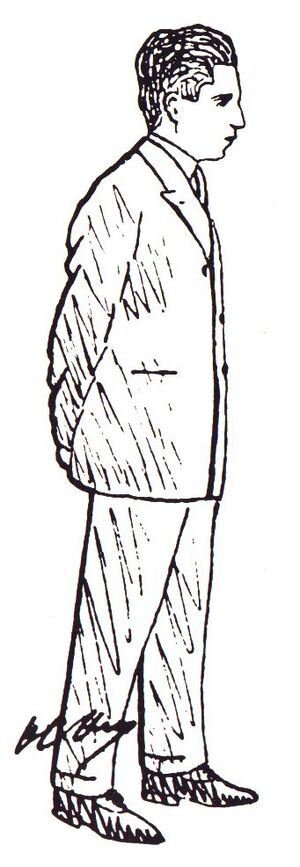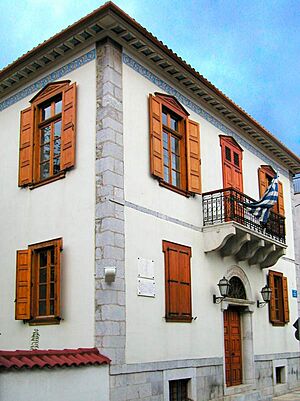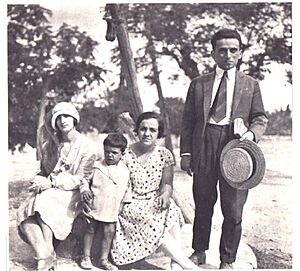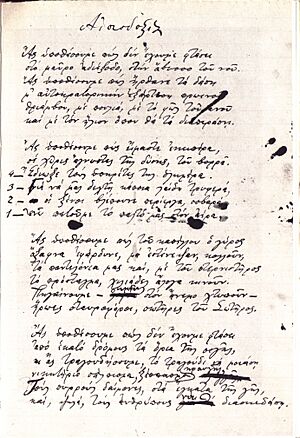Kostas Karyotakis facts for kids
Kostas Karyotakis (born November 11, 1896 – died July 20, 1928) was a very important Greek poet from the 1920s. He was one of the first poets in Greece to use new and different ideas, sometimes challenging old ways of thinking. His poetry often showed a lot of nature, vivid pictures, and feelings of expressionism and surrealism. He was also part of a group of writers known as the Greek Lost Generation.
Many people didn't think highly of Karyotakis during his life. But after he died, most people realized he was a truly great poet. He had a big influence on Greek poets who came after him.
Contents
Biography
Karyotakis added deep meaning and a sad, powerful feeling to the emotional and melancholic poems of his time. He was very clear-minded and saw things sharply. He bravely showed in his poems the feelings of confusion and the difficult situations his generation faced. He also wrote about his own inner struggles.
Early life
Kostas Karyotakis was born in Tripoli, Greece. His father was a county engineer, which meant his family moved around a lot. Because of this, Kostas spent his childhood and teenage years in many different Greek cities. These included Argostoli, Lefkada, Larisa, Kalamata, Athens, and Chania. He started publishing his poems in various magazines for children in 1912.
After he finished his degree from the Athens School of Law and Political Sciences in 1917, he decided not to become a lawyer. Instead, Karyotakis became a clerk in the city of Thessaloniki. However, he really disliked his job. He couldn't stand the many rules and paperwork of the government, which is called bureaucracy. He often wrote about this dislike in his poems. His writing piece called Catharsis (meaning 'purification') shows this clearly. Because he disliked his work so much, he was often moved to different places in Greece. During these moves, he experienced the boredom and sadness of the country during World War I.
Adulthood and career
In February 1919, Karyotakis published his first collection of poems. It was called The Pain of People and of Things. Most critics didn't pay attention to it or gave it bad reviews. In the same year, he and his friend Agis Levendis started a satirical magazine called The Leg. A satirical magazine makes fun of things in a clever way. Even though it was popular, the police stopped it after only six issues. In 1921, he published his second collection of poems called Nepenthe. He also wrote a musical show called Pell-Mell.
In 1924, he traveled to other countries, visiting Italy and Germany. In December 1927, he published his last collection of poems: Elegy and Satires. In February 1928, Karyotakis was moved to Patras. But soon after, he spent a month on vacation in Paris. In June 1928, he was sent again to Preveza by ship.
Death
Karyotakis lived in Preveza for only 33 days before he died on July 21, 1928. He was 31 years old. He worked in the Prefecture of Preveza as a lawyer. His job was to check land donations from the government to refugees. These refugees were people who had to leave their homes because of the Asia Minor War of 1922.
Selected works
Poems and collections
- Xeprovodisma (1919)
- When you Came... (1919)
- Your Letters (1920)
- The Pain of Men and Things (1919)
- Nepenthe (1921)
- Song (1922)
- Lycabettus (1922)
- the Ash beyond the Horizon... (1923)
- Varium et Mutabile (1923)
- Escape (1923)
- Prepare (1923)
- Elegies and Satires (1927)
- Optimism (1929) (Published after his death)
- Sunday (1929) (Published after his death)
- Preveza (1930) (Published after his death)
- When we get down the stairs... (1933) (Published after his death)
Translations
- Elegias e Sátiras/Ελεγεία και Σάτιρες, translated by Théo de Borba Mossburger, published in (n.t.) Revista Literária em Tradução, nº 1 (set/2010), Fpolis/Brasil, ISSN 2177-5141
See also
 In Spanish: Kostas Karyotakis para niños
In Spanish: Kostas Karyotakis para niños
 | James Van Der Zee |
 | Alma Thomas |
 | Ellis Wilson |
 | Margaret Taylor-Burroughs |





